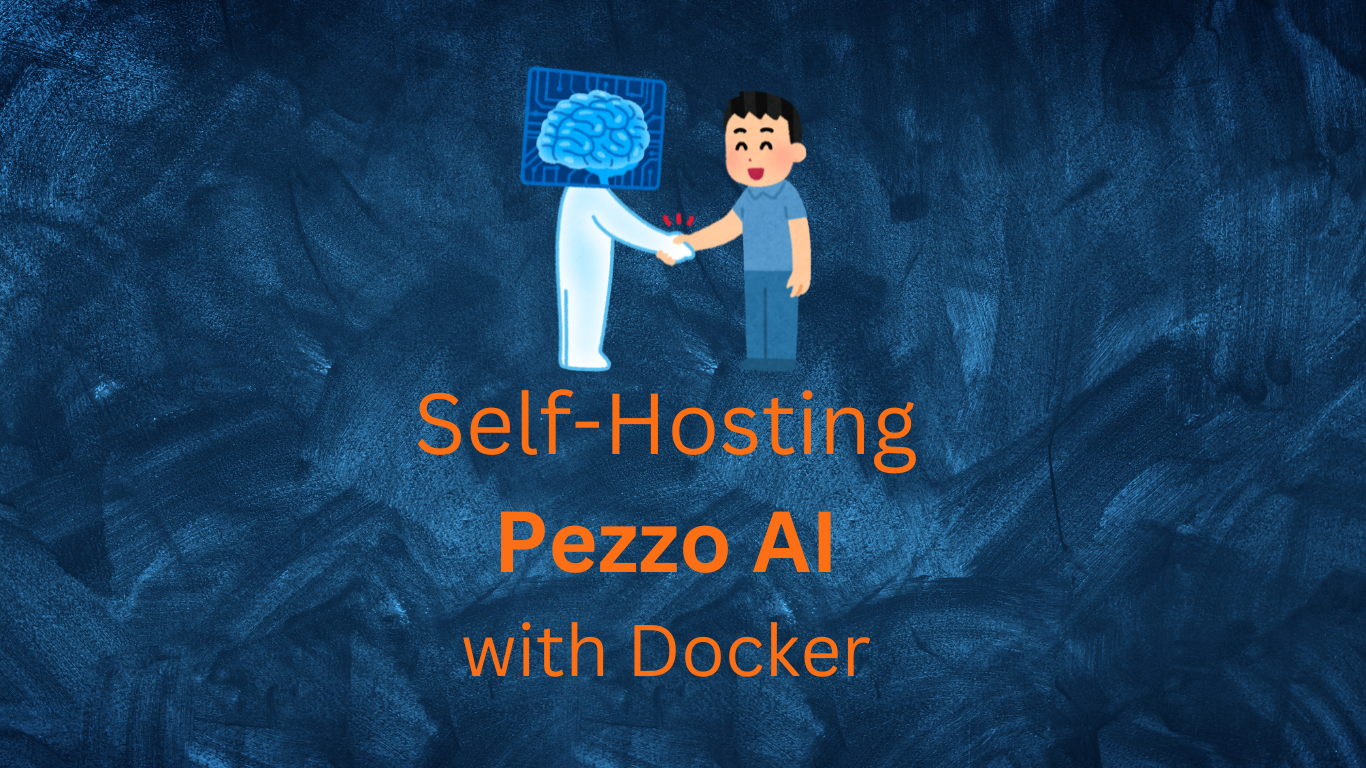Pezzo AI is a developer-first, open-source platform designed to streamline the development and deployment of applications that leverage large language models (LLMs).
-
Key Features of Pezzo AI
- Focus on Developer Experience:
- Centralized Prompt Management 🎛️: Offers a central location to manage all prompts, simplifying organization and version control. Explore more.
- Streamlined Prompt Design & Versioning 📝: Facilitates easy creation, editing, testing, and versioning of prompts, enhancing the iterative process. Discover how.
- Instant Deployments ⚡: Supports rapid deployment of LLM functionalities, enabling faster experimentation and shortened development cycles. Learn about deployments.
- Focus on Developer Experience:
-
Why to keep reading?
- You will discover how to use Pezzo AI
- It will NOT cost money, neither cloud registrations ✅
The Pezzo AI Project
Pezzo AI aims to streamline prompt design, version management, instant delivery, collaboration, troubleshooting, observability and more.
- The Developer-First AI Platform, have a look at the project:
Open-source, developer-first LLMOps platform
Why Pezzo AI
Pezzo is an open-source AI development toolkit that provides a centralized platform for managing AI prompts, experiments, and models.
It aims to streamline the AI development process by making it easier for developers to collaborate, optimize costs, and troubleshoot issues.
- Core Benefits
- Increased Developer Productivity 🚀: Streamlined workflows and centralized tools boost efficiency, focusing on innovation.
- Improved Collaboration 🤝: Provides a shared space for managing prompts and functionalities, enhancing teamwork.
- Reduced Development Costs 💸: Efficient resource management and faster deployments contribute to cost savings.
With Pezzo AI you can… 👇
Pezzo is a valuable resource for developers and teams working with AI models. It can be used to:
- Prompt Management: Simplify creation, editing, and version control of AI prompts.
- Experimentation: Conduct A/B tests and target specific experiments to enhance conversion rates.
- Cost Optimization: Achieve up to 50% savings in AI operations through optimized resource management.
- Real-Time Trading: Utilize advanced features for real-time trading and access comprehensive charts.
- Comprehensive Troubleshooting: Leverage execution history, time-travel debugging, and robust test suites for confident deployment.
SelfHosting Pezzo AI
First Things First - Get Docker! 🐋
Important step and quite recommended for any SelfHosting Project - Get Docker Installed
It will be one command, this one, if you are in Linux:
apt-get update && sudo apt-get upgrade && curl -fsSL https://get.docker.com -o get-docker.sh
sh get-docker.sh && docker version
Pezzo AI with Docker
In order to run Pezzo AI using Docker Compose, use the following commands:
git clone https://github.com/pezzolabs/pezzo.git
cd pezzo
docker-compose up
These commands will clone the Pezzo repository from GitHub, navigate into the Pezzo directory, and then start the Pezzo stack.
It will download and execute the Docker images from Github Container Repository:
- ghcr.io/pezzolabs/pezzo/server:latest
- ghcr.io/pezzolabs/pezzo/console:latest
- ghcr.io/pezzolabs/pezzo/proxy:latest
If you are curious…
…this is how the PezzoAI Docker Compose looks like 👇
include:
- ./docker-compose.infra.yaml
services:
pezzo-server:
image: ghcr.io/pezzolabs/pezzo/server:latest
build:
context: .
dockerfile: ./apps/server/Dockerfile
restart: always
env_file:
- ./.env
- ./.env.local
- ./apps/server/.env
- ./apps/server/.env.local
environment:
- DATABASE_URL=postgres://postgres:postgres@postgres:5432/pezzo
- SUPERTOKENS_CONNECTION_URI=http://supertokens:3567
- CLICKHOUSE_HOST=clickhouse
- REDIS_URL=redis://redis-stack-server:6379
- KMS_LOCAL_ENDPOINT=http://local-kms:9981
ports:
- "3000:3000"
depends_on:
pezzo-prisma-migrate:
condition: service_completed_successfully
pezzo-clickhouse-migrate:
condition: service_completed_successfully
postgres:
condition: service_healthy
supertokens:
condition: service_healthy
clickhouse:
condition: service_healthy
redis-stack-server:
condition: service_healthy
healthcheck:
test: ["CMD-SHELL", "curl 'http://pezzo-server:3000/api/healthz'"]
interval: 10s
timeout: 5s
retries: 5
pezzo-console:
image: ghcr.io/pezzolabs/pezzo/console:latest
build:
context: .
dockerfile: ./apps/console/Dockerfile
restart: always
env_file:
- ./.env
- ./apps/console/.env
ports:
- "4200:8080"
depends_on:
pezzo-server:
condition: service_healthy
pezzo-proxy:
image: ghcr.io/pezzolabs/pezzo/proxy:latest
build:
context: .
dockerfile: ./apps/proxy/Dockerfile
restart: always
env_file:
- ./.env
- ./apps/proxy/.env
ports:
- "3001:3000"
depends_on:
pezzo-server:
condition: service_healthy
Now you can use Pezzo AI at:
localhost:3000
The services and components that run with this stack include PostgreSQL, Redis and the Pezzo components (Server, Console).
It will also automatically apply database migration to the PostgreSQL database.
After the stack has started, you can access the PezzoAI Console at http://localhost:4200.
FAQ
How to use Pezzo AI with Python
pip install pezzo
from pezzo.client import pezzo
Is Pezzo AI API Up?
import requests
url = "https://api.pezzo.ai/api/healthz"
response = requests.request("GET", url)
print(response.text)
How to iterate with Python and AI Apps with Docker-Compose ⏬
FROM python:3.10-slim
# Install git
RUN apt-get update && apt-get install -y git nano
# Set up the working directory
WORKDIR /app
# Clone the repository
#RUN git clone https://github.com/JAlcocerT/openai-chatbot
#WORKDIR /openai-chatbot
# Install Python requirements
#RUN pip install -r requirements.txt
# Set the entrypoint to a bash shell
CMD ["/bin/bash"]
export DOCKER_BUILDKIT=1
docker build --no-cache -t pythonaicontainer . #> build_log.txt 2>&1
Or if you prefer, with Podman:
podman build -t pythonaicontainer .
#podman run -d -p 8501:8501 pythonaicontainer
docker run -d --name python_container_for_dev -p 8502:8501 pythonaicontainer tail -f /dev/null
And go to its interactive terminal with:
docker exec -it python_container_for_dev /bin/bash
#podman exec -it python_container_for_dev /bin/bash
With Portainer:
version: '3'
services:
dev-pythonaicontainer:
image: pythonaicontainer
container_name: pythonaicontainer
volumes:
- ai_pythonaicontainer:/app
working_dir: /app # Set the working directory to /app
#command: /bin/sh -c "streamlit run streamlit_app.py"
command: tail -f /dev/null #streamlit run appv2.py # tail -f /dev/null
ports:
- "8507:8501"
volumes:
ai_pythonaicontainer:
